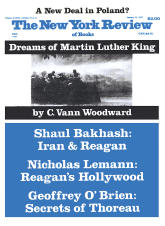To the Editors:
Your readers may be interested in the following statement, which was originally signed by 122 Central and East European activists.
PREAMBLE
On the anniversary of the Hungarian Revolution 30 years ago: On the 23rd of October 1956, workers, students and soldiers stormed the radio building of Budapest because they were fed up with the official lies and wished to hear the truth and to voice their demands. They destroyed Stalin’s statue and the credibility of the regime which called itself a dictatorship of the proletariat and a republic of the people. The struggle made it clear that what the Hungarian people really wanted was independence, democracy and neutrality. They wanted to live in peace in a free and decent society.
The Hungarian Revolution, as well as the uprising in East Berlin, the Prague Spring and the social movement of the free trade union Solidarity in Poland were suppressed either by Soviet intervention or by domestic military violence. Over the past 30 years life has become easier for many; some people can express themselves without being thrown in jail. But the essential demands of the revolutionaries have not been realized.
JOINT STATEMENT COMMEMORATING THE THIRTIETH ANNIVERSARY OF THE
HUNGARIAN REVOLUTION
On the day of the anniversary of the Hungarian Revolution, we appeal to our friends around the world to join us in commemorating this event. We wish to reiterate our joint determination to struggle for political democracy in our countries, for independence, for pluralism based on the principles of self-management, for peaceful reunification of divided Europe and its democratic integration, as well as for the rights of all minorities. We emphasize support for one another in our current struggles for a better, more decent and freer life in our countries and the whole world. The tradition and experiences of the Hungarian Revolution remain our common heritage and inspiration.
Budapest, Berlin, Prague, Warsaw
October 23, 1986
Signed by: 54 Hungarians, including Istvan Csurka, Miklos Haraszti, Janos Kis, Gyorgy Konrad, Ferenc Koseg, Gabriella Lengyel, Laszlo Rajk, Sandor Racz, Laszlo Rusai, and Mihaly Vajda; 24 Czechs and Slovaks, among them Jiri Dienstbier, Jiri Hajek, Vaclav Havel, Eva Kanturkova, Jaroslav Sabata, and Petr Uhl; 16 from the German Democratic Republic, including Barbel Bohley, Ralf Hirsch, and Wolfgang Templin; 23 Poles, including Marek Edelman, Wiktor Kulerski, Zofia Kuratowska, Jacek Kuron, Jan Jozef Lipski, and Adam Michnik. Shortly after the statement was issued three Rumanians added their signatures: Nicolae Carandino, Corneliu Coposu, and Ion Puiu.
Since this letter was first signed there have been additional signatories from both Eastern and Western Europe, including three Rumanians whose names are listed above, and the Parliamentary Group of the German Social Democratic Party. In some of the East bloc countries, individuals who signed the statement are being harassed and interrogated about how the appeal was circulated.
The signatories have asked the East European Cultural Foundation to collect further signatures from democratic friends in the West. More information can be obtained from the EECF, which helped to coordinate the discussions in Central and Eastern Europe formulating the statement and to gather the original list of signatures. The EECF can be reached at the following address: PO Box 222, London WC2H 9RP, England.
Joanne Landy
Campaign for Peace and Democracy/East and West
New York City
This Issue
January 15, 1987



